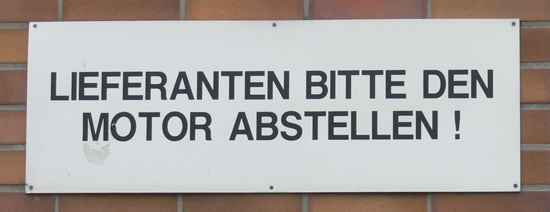Like English, German often employs suffixes to add meaning or to produce other parts of speech. Here is a further discussion of this phenomenon, already introduced with examples derived from the verb "sprechen".
|
|
 |
| Long-lasting hair removal at home - is that at all possible? | |
Using the Suffix "-e" to Derive Feminine Nouns from Verbs:
Certain verbs add "-e" to the present or past verb stem (with or without an umlaut) to create a feminine noun. The plural is "-n".
| Verb | Noun | Plural | Meaning |
| ehren | die Ehre | die Ehren | honor |
| haben | die Habe | die Haben | belongings; chattels |
| lieben | die Liebe | [no plural] | love |
| waschen | die Wäsche | [no plural] | laundry; linens |
| lügen | die Lüge | die Lügen | lie |
| nehmen | die Einnahme | die Einnahmen | revenue |
| schrauben | die Schraube | die Schrauben | screw |
| sprechen | die Sprache | die Sprachen | language |
Here are some others that are also (mostly) feminine after adding the suffix "-t" or "-st":
| ankommen | die Ankunft | die Ankünfte | arrival |
| dienen | der [!] Dienst | die Dienste | service |
| fahren | die Fahrt | die Fahrten | drive; trip |
| können | die Kunst | die Künste | art; craft |
| laden | die Last | die Lasten | burden |
| machen [!] | die Macht | die Mächte | power; might |
| tun | die Tat | die Taten | deed |
Using "-e" to Derive Nouns from Adjectives (in addition to Adjectival Nouns )
Most adjectives that take an umlaut in the comparative also form feminine nouns that have umlauts and end in "-e":
| Adjective | Noun | Meaning |
| flach | die Fläche | surface |
| glatt | die Glätte | smoothness; slickness |
| groß | die Größe | size; greatness |
| gut | die Güte | goodness; benevolence |
| hard | die Härte | hardness |
| heiß | die Hitze | heat |
| kalt | die Kälte | cold |
| kurz | die Kürze | brevity |
| lang | die Länge | length |
| nah | die Nähe | vicinity |
| nass | die Nässe | wetness |
| rot | die Röte | redness |
| scharf | die Schärfe | sharpness |
| stark | die Stärke | strength |
| warm | die Wärme | warmth |
This list also contains some that are ineligible for umlauts:
| breit | die Breite | breadth |
| tief | die Tiefe | depth |
The Diminutives "-chen" and "-lein"
- "das Brötchen" (bread roll), "das Fräulein" (Miss; young unmarried woman); "das Frühchen" (premature baby); "das Grübchen" (dimple); "das Männchen und das Weibchen" (male and female [of a species]); "das Märchen" (fairy tale); "das Schläfchen" (nap); "das Schnäppchen" (a bargain); "das Schnäpschen" (a quick drink); "das Kaninchen" (rabbit [note the lack of umlaut]); and "das Mädchen" (girl).
- "die Brüderlichkeit" (brotherliness); "die Ehrlichkeit" (honesty); "die Eitelkeit" (vanity); "die Freundlichkeit" (friendliness); "die Gläubigkeit" (devoutness); "die Heiligkeit" (sacredness; saintliness); "die Heiterkeit" (cheerfulness); "die Langsamkeit" (slowness); "die Lesbarkeit" (legibility; readability); "die Lösbarkeit" (solubility); "die Richtigkeit" (correctness).
- "die Bescheidenheit" (humility; modesty); "die Eigenheit" (peculiarity; quirk); "die Feigheit" (cowardice); "die Freiheit" (freedom); "die Gleichheit" (equality); "die Klarheit" (clarity); "die Schüchternheit" (bashfulness; timidity); "die Sicherheit" (certitude; safety)
- "Mausi" (little mouse); "Schatzi" (little treasure); "Spatzi" (little sparrow).
- "die Anarchie" (anarchy); "die Biologie" (biology"); "die Bourgeoisie" (bourgeoisie); "die Chemie (chemistry); "die Pedanterie" (pedantry); "die Philosophie" (philosophy"); "die Psychologie" (psychology); "die Theorie" (theory).
- "die Akrobatik" (acrobatics); "die Logik" (logic); "die Logistik" (logistics"; "die Mathematik" (mathematics); die Musik (music); "die Physik (physics); "die Romantik" (romanticism").
- "der Alkoholismus" (alcoholism); "der Antisemitismus" (anti-Semitism); "der Kubismus" (cubism); "der Faschimus" (fascism); "der Kapitalismus" (capitalism); "der Kommunismus" (communism); "der Naturalismus" (naturalism); "der Tourismus" (tourism).
- "der/die Faschist/in" fascist; "der/die Kapitalist/in" (capitalist); "der/die Kommunist/in" (communist); "der/die Tourist/in" (tourist);
but: "der/die Alkoholiker/in" (alcoholic); "der/die Antisemit/in" (anti-Semite). - "der/die Avantgardist/in" (avant-gardist); "der/die Komponist/in" (composer); "der/die Prokurist/in" (authorized officer [of a company]); "der/die Polizist/in" (police officer).
- "das Ärgernis" (annoyance; offense); "das Bedürfnis" (need); "das Begräbnis" (burial); "die [!] Besorgnis" (anxiety; apprehension); "das Ereignis" (event; occurrence); "das Erzeugnis" (product); "die [!] Finsternis" (darkness; gloom); "das Gedächtnis" (memory); "das Gefängnis" (prison); "das Geheimnis" (secret); "das Geständnis" (confession); "das Hindernis" (barrier; hindrance); "das Verhängnis" (fate; doom); "das Verständnis" (understanding; comprehension); "das Verzeichnis" (catalogue; list); "die [!] Wildnis" (wilderness).
- "die Astrologie" (astrology); "die Biologie" (biology); "die Erdkunde" (geography); "die Heilkunde" (alternative medicine); "die Ökologie" (ecology); "die Theologie" (theologie).
- "die Agressivität" (aggressiveness); "die Aktivität" (activity); "die Brutalitäat" (brutality); "die Nationalität" (nationality); "die Objektivität" (objectivity); "die Qualität" (quality); "die Solidarität" (solidarity); "die Subjektivität" (subjectivity).
- "der/die Arbeiter/in" (worker); "der/die Besitzer/in" (owner); "der/die Fahrer/in" (driver); "der/die Heuchler/in" (hypocrite); "der/die Leser/in" (reader); "der/die Maler/in" (painter); "der/die Richter/in" (judge); "der/die Schneider/in" (taylor); "der/die Sieger/in" (victor); "der/die Spieler" (player; gambler); "der/die Trainer/in" (coach); "der/die Trinker/in (drinker).
- "der/die Botschafter/in" (ambassador); "der Eisenbahner" (railwayman), "der/die Schüler/in" (pupil; schoolboy/schoolgirl).
- "der/die Bäcker/in" (baker); "der/die Gärtner/in (gardener); "der/die Färber/in" (dyer); "der/die Läufer/in" (runner); "der/die Sänger/in" (singer); "der/die Schriftsteller/in" (writer); "der/die Tänzer/in" (dancer); "der/die Überläufer/in" (defector); "der/die Verkäufer/in" (salesman/saleslady); "der/die Verräter/in" (traitor)
- "die Brauerei" (brewery); "die Färberei" (dye works); "die Gärtnerei" (botanical nursery); "die Gerberei" (tannery); "die Konditorei" (confectionery; pastry shop); "die Metzgerei" (butcher shop).
- "der Abstecher" (side-trip); "der Fehler" (error); "der Seufzer" (sigh); "der Schnitzer" (blunder; howler); "der Treffer" (strike, hit, success [something that hits the mark])
- "der/die Berliner/in"; "der/die Münchner/in"; "der/die New Yorker/in"; "der/die Kanadier/in"; "der/die Engländer/in"; "der/die Norweger/in"; "der/die Österreicher/in"; "der/die Schweizer/in".
- "der Franzose/die Französin"; "der Schwede/die Schwedin"; "der Türke/die Türkin".
- "der Bagger" (power shovel); "der Fernseher" (television set); "der Fernsprecher" (telephone); "der Kopierer" (copier); "der Kugelschreiber" (ballpoint pen); "der Lautsprecher" (loudspeaker); "der Lichtschalter" (light switch); "der Rasenmäher" (lawn-mower); "der Scheibenwischer" (windshield-wiper); "der Schläger" (racquet; bat; club); "der Schraubenzieher" (screwdriver; "der Staubsauger" (vacuum-cleaner); "der Wecker" (alarm-clock); "der Zahnstocher" (toothpick).
- "der Aschenbecher" becomes "der Ascher" (ashtray); "der Lastkraftwagen" = "der Laster" (truck, lorry); "das Frachtschiff" = "der Frachter" (freighter); "der Fußballspieler" = "der Fußballer" (soccer player).
- "die Barbarei" (barbarism); "die Heuchelei" (hypocrisy); "die Schlägerei" (brawl); "die Schweinerei" (mess; swinishness)
"-erei" can also be appended to most verbs to denote an activity taken to extremes, e.g. "die Fahrerei" (a tedious amount of driving). - "der/die Muttersprachler/in" (native speaker); "der/die CDUler/in" (member of the CDU); "der/die Abstinenzler/in" (teetotaler); "der/die Sportler athlete/in" (native speaker); "der/die Wissenschaftler/in" (scientist); "der/die Gewerkschaftler/in" (unionist); "der/die Frauenrechtler/in" (feminist); "der/die Schwergewichtler/in" (heavyweight); "der/die Straftrechtler/in" (criminal lawyer).
- Often the stem noun is umlauted:
- "der/die Hauptfächler/in" (major [a student who majors in a subject]);
"der/die Erstklässler/in" (first-grader);
"der/die Künstler/in" (artist);
"der/die Hinterbänkler/in" (back-bencher);
"der/die Hinterwäldler/in" (someone from the back woods; hick);
"der/die Zuchthäusler/in" (convict);
"der/die Freiberufler/in" (freelancer);
"der/die Ausflügler/in" (excursionist; someone on an outing);
"der/die Nachzügler/in" (latecomer; straggler ).
If there is an "-e" at the end of the stem noun, it is deleted. Thus a specialist in local history ("Heimatkunde") becomes "der/die Heimatkundler/in".
The created noun is not necessarily a human: "der/die Tausendfüßler" (millipede; centipede). - "der/die Diktator/in" (dictator); "der/die Sekretär/in" (secretary); "der/die Volontär/in" (intern); "der Frisör / die Friseuse [or: Frisöse]" (barber; hairdresser); "der/die Ingenieur/in" (engineer); "der/die Regisseur/in" ([film or theater] director); "der/die Direktor/in" (director [of a business or other organization]); "der/die Lektor/in" (editor); "der Traktor" (tractor); "der Ventilator" (fan)
- "der Ankömmling" (newcomer); der Emporkömmling (parvenue); "der Neuankömmling" (newcomer; johnny-come-lately); "der Flüchtling" (refugee; fugitive); "der Fremdling" (stranger); "der Günstling" (minion); "der Häftling" (prisoner); "der Häuptling" (chieftain); "der Lehrling" (apprentice); "der Säugling" (nursling; infant); "der Schwächling" (weakling).
- "der [!] Akrobat" (acrobat); "das Antiquariat" (second-hand bookstore); "das Dikat" (dictation; diktat); "das Konsulat" (consulate); "das Proletariat" (proletariat); "das Referat" (seminar paper); "das Telefonat" (telephone call); "das Traktat" (treatise).
- "die Beamtenschaft" (civil service); "die Botschaft" (embassy; message); "die Bruderschaft" (fraternity); "die Bürgerschaft" (citizenry; citizenship); "die Gegnerschaft" (opponents; emnity); "die Gesandtschaft" (the duties and/or the residence and office of an ambassador); "die Hinterlassenschaft" (bequest; legacy); "die Ortschaft" (locality; town); "die Studentenschaft" (student body).
- "die Gemeinschaft" (community; association; collective); "die Gesellschaft" (society; [commercial] company); "die Gewerkschaft" (labor union); "die Mannschaft" (team)
- "die Errungenschaft" (acquisition; accomplishment); die Rechenschaft (account; accountability)
- "die Bekanntschaft" (acquaintance; acquaintanceship); "die Bereitschaft" (readiness); "die Freundschaft" (friendship); "die Gefangenschaft" (captivity); "die Meisterschaft" (mastery; championship); "die Mitwisserschaft" (cognizance); "die Mutterschaft" (maternity); "die Vaterschaft" (paternity); "die Wirtschaft" (economy; economic system; inn); "die Wissenschaft" (science).
- "das Christentum" (Christianity); "das Eigentum" (property; possession"; "das Heldentum" (heroism); "der [!] Irrtum" (state of error; error); "das Judentum" (Jewry; Judaism); "das Königtum" (kingdom); "der [!] Reichtum" (riches); "das Volkstum" (folklore); "das Wachstum" (growth; increase).
- "die Redensart" (saying; idiom; expression; colloquialism); "die Sportart" ([a particular] sport)
- "-sorte" (kind; sort) is similar, but it "is limited to two uses: (a) it is applied to things, particularly food, in so far as they are bought and sold; (b) it is a term of contempt applied particularly to persons."2
- "die Menschensorte" (type of person); "die Obstsorte" (kind of fruit); "die Weinsorte" (kind of wine).
- "das Labsal" (refreshment); "die Mühsal" (hardship; plight); "das Scheusal" (monster); "das Schicksal" ([imposed] fate); "die Trübsal" (affliction; tribulation)
- "das Mitbringsel" (a small gift [e.g. a hostess gift]; "das Überbleibsel" (remnant; left-over object)
But also: "das Blutgerinnsel" (blood clot); "der Stöpsel" (stopper; cork; bung). - "das Bildungswesen" (field of education; system of education); "das Gesundheitswesen" (health care); "das Ingenieurwesen" (engineering); "das Rechnungswesen" (accounting).
- "das Fahrzeug" (vehicle); "das Flugzeug" (airplane); ; "das Schreibzeug" (writing utensils); "das Spielzeug" (toy); "das Werkzeug" (tool).
- "affenartig" (ape-like); "fremdartig" (strange); "großartig" (grand); "turmartig" (tower-like).
- "bespielbar" (playable); "dankbar" (grateful); "fruchtbar" (fruitful; fertile); "lesbar" (legible); "schiffbar" (navigable); "unsichtbar" (invisible; "sonderbar" (peculiar); "strafbar" (punishable by law); "trinkbar" (potable); "unfehlbar" (infallible)
- "gläsern" (of glass); "golden" (golden); "hölzern" (wooden); "silbern" (silver); "wächsern" (waxen); "wollen" (woolen).
- "einmal" (once); "zweimal" (twice); "vielfältig" (manifold; multifaceted; varied); "zweifach" (two-fold).
- Sometimes the word takes on a figurative meaning: "einfach" (single; simple); "einfältig" (simple-minded); "einmalig" (unique).
- "boshaft" (malicious); "dauerhaft" (long-lasting); "ehrenhaft" (honorable); "ekelhaft" (nauseating); "glaubhaft" (credible); "krankhaft" (morbid); "lebhaft" (lively); "schmeichelhaft" (flattering); "schwatzhaft" (chatty; loquacious); "tugendhaft" (virtuous); "wohnhaft" (domiciled)
- Note: an older form, "-haftig" (e.g. "leibhaftig" [incarnate]), is much less frequent, but it replaces "-haft" if the adjective is then to become an abstract noun using "-keit": e.g. "die Tugendhaftigkeit" (virtuousness).
- 1) When affixed to a noun (sometimes adding an umlaut), it denotes the presence of that thing or quality:
- "fleißig" (industrious); "fettig" (greasy); "freudig" (joyous; glad); "sandig (sandy); "sonnig" (sunny); "traurig" (sad); "unabhängig" (independent); "verdächtig" (suspicious).
- 2)"-ig" (and adding an umlaut where possible) can also turn a span or unit of time into an adjective:
- "ein fünfjähriger Junge" (a five-year-old boy); "eine zweitägige Autofahrt" (a two-day drive); "eine mehrwöchige Reise" (a journey of several weeks); "die heutige Jugend" (today's youth).
- 3) "-ig" also adds the sense of "inclined to":
- "bissig" (inclined to bite); "ergiebig" (productive"); "freigiebig" (generous, lavish); "feinfühlig" (sensitive; of delicate feeling); "gefällig" (agreeable; anxious to please); "gläubig" (believing; religious); "hartherzig" (hard-hearted); "schwerhörig" (hard of hearing)
- 1) When affixed to a noun (often one that is derived from a verb using "-er"), "-isch" can denote its associated qualities:
- "allergisch" (allergic); "demokratisch" (democratic); "dichterisch" (poetic); "erfindersich" (inventive); "fachmännisch" (expert; craftsmanlike); "höllisch" (infernal); "irdisch" (earthly); "kriegerisch" (warlike); "malerisch" (picturesque); "phobisch" (phobic); "tierisch" (animalistic; bestial); "träumerisch" (dreamy); "verschwenderisch" (extravagant; wasteful).
2) Other kinds of associations with "-isch":- "biologisch" (biological), "historisch" (historical); "hysterisch" (hysterical); "kindisch" (childish - compare "kindlich" [childlike]); "künstlerisch" (artistic)- compare "künstlich" (artificial); "linkisch" (awkward; bumbling); "regnerisch" (rainy); "städtisch" (municipal); "mürrisch" (crabby); "zänkisch" (quarrelsome).
- 3) "-isch" can create the adjectival form of a city, region, country, or people:3
- "amerikanisch" (American); "badisch" (from or of Baden); "berlinerisch" (of or from Berlin); "englisch" (English); "französisch" (French); "italienisch" (Italian); "jüdisch" (Jewish); "niederländisch" (Dutch); "norwegisch" (Norwegian); "russisch" (Russian); "spanisch" (Spanish).
- 4) The same word can also usually, when appropriate, become a neuter noun that designates the language:
- "(das) Englisch" (English; the English language); "(das) Französisch" (French; the French language); "(das) Schwedisch" (Swedish; the Swedish language).
- "aggressiv", "aktiv", "alternativ", "argumentativ", "attraktiv", "dekorativ", "effektiv", "fiktiv", "impulsiv", "instinctiv", "intensiv", "primitiv", etc.
- Often the stem vowel is umlauted:
- "ängstlich" (timid; anxious; fearful); "ärmlich" (squalid; impoverished); "brüderlich" (brotherly); "gebräuchlich" (common; customary); "jährlich" (annual); "jämmerlich" (wretched); "käuflich" (purchasable; corrupt); "kränklich" (sickly); "kürzlich" (recently); "männlich" (masculine; manly); "mütterlich" (maternal; motherly); "nebensächlich" (secondary; negligible); "täglich" (daily); "tödlich" (deadly; fatal); "unmissverständlich" (unequivocal); "väterlich" (paternal; fatherly); "verlässlich" (reliable); "völlig" (completely); "zärtlich" (tender).
- But often it is not:
- "behaglich" (comfortable; cozy); "fraglich" (questionable); "sachlich" (objective; to the point); "sportlich" (athletic; sporty); "sprachlich" (linguistic); "stattlich" (stately; grand); "tauglich" (capable; qualified); "unerforschlich" (inscrutable); "unglaublich" (unbelievable); "verdaulich" (digestible).
- Occasionally, "-lich" is extended to "-erlich":
- "fürchterlich" (frightful; appalling); "lächerlich" (ridiculous); "leserlich" (readable).
- When the stem ends in "-en", a so-called "excrescent -t-" is interjected before the suffix:
- "hoffentlich" (hopefully; it is to be hoped); "gelegentlich" (occasional); "tunlich" (feasible); "wissentlich" (knowingly); "wöchentlich" (weekly).
- Further examples of "-lich:
- "bekanntlich" (as is well known); "bestechlich" (bribable; corruptible); "friedlich" (peaceful); "glücklich" (happy; fortunate); "kindlich" (childlike - compare "kindisch" [childish]); "kleinlich" (petty); "künstlich" (artificial - compare "künstlerisch" [artistic]); "polizeilich" (of or by the police); "schriftlich" (written); "sinnlich" (sensual); "unentbehrlich" (indispensable); "unerklärlich" (inexplicable); "unnachahmlich" (inimitable); "unzertrennlich" (inseparable); "weiblich" (feminine).
- "-los" is cognate with the English "-less" and has the same function:
- "arbeitslos" (unemployed); "ärmellos" (sleeveless); "bewegungslos" (motionless); "endlos" (never-ending); "gefühllos" (unfeeling); "humorlos" (humorless); "mitleidslos" (unpitying); "regungslos" (motionless); "sprachlos" (speechless); "verantwortungslos" (irresponsible).
- "-leer" means empty of, indicating that something used to be there that is now gone:
- "luftleer" (void of air); "menschenleer" (empty of people; deserted).
- "-arm" means low in:
- "fettarm" (low-fat); "kalorienarm" (low in calories).
- "-frei" means free of and implies something positive:
- "eisfrei" (clear of ice); "sorgenfrei" (carefree).
- "biegsam" (flexible); "einsam" (lonely; solitary); "empfindsam" (sensitive; sentimental); "enthaltsam" (abstemious); "erholsam" (restorative); "folgsam" (obedient); "furchtsam" (timid); "gewaltsam" (violent); "langsam" (slow); "mühsam" (laborius; tedious); "ratsam" (advisable); schweigsam (taciturn); "seltsam" (strange; peculiar); "sparsam" (thrifty); "unaufhaltsam" (inexorable); "wirksam" (efficacious).
- "fragwürdig" (questionable); "glaubwürdig" (believable); "hörenswert" (worth listen to"); "lesenswert" (worth reading); "liebenswert" (lovable; adorable); "liebenswürdig" (lovable; kind; agreeable); "merkwürdig" (strange); "sehenswert" or "sehenswürdig" (worth seeing); "vertrauenswürdig" (trustworthy); "wissenswert" (worth knowing).
A diminutive form of most nouns can be created by adding the suffixes "-chen" and "-lein" and - almost always - umlauting the stem vowel when possible; if the noun ends in "-e", that is dropped ("die Schraube" becomes "das Schräubchen" [small screw]). All such resulting nouns are neuter, with a plural form that is identical with the singular (i.e.: "das Schräubchen, die Schräubchen"). They indicate a smaller (and often younger) version of the original (e.g. a "Hundchen" [no umlaut!] is a puppy - compare English "-kin" [lambkin] or "-ie" [doggie]). In modern German, "-chen" is the more frequent form, while "-lein" is generally confined to diminutives that were established in earlier times. "Sprüchlein" (a small saying) is one such example. It is the more conventional form, although "Sprüchchen" can also be encountered.
Dialects, particularly Southern ones, offer many further possible suffixes, including "-ke", "-le", "-li", "-l", and "-erl". Nicknames frequently receive an "-i" or "-ie" ("Hansi", "Berti", "Angie").
|
|
 |
|
Take a baggie for my poopie.
(Viennese dialect) |
|
Beginning students of German may be tempted to employ the diminutive when unsure of a noun's gender or plural. When forgetting the gender or plural of "der Stuhl; die Stühle," they find certitude in "das Stühlchen". But they need to be aware that diminutives are accompanied by a particular affect. They are often used in saccharine fashion with small children or to convey belittlement:
| Was für ein süßes Hütchen hat dein Püppchen! |
| What a sweet little hat your dolly has! |
| Der Fußballer hat es nur zu einem harmlosen Schüsschen gebracht. |
| The soccer-player only managed to come up with a harmless, dinky little shot. |
| "Früher oder später werden unnützliche Sprächlein und Kultürchen im Sumpf der Realität versinken, und das ist gut so."1 |
| Sooner or later, useless little languages and cultures will sink into the swamp of reality, and that is all to the good. |
At the same time, a number of diminutives have become established in their own right, e.g.:
The Suffixes "-heit" and "-keit":
"-heit" or "-keit" can be added to many adjectives to create nouns (that are always feminine). If the adjective has been derived from another word via a suffix like "-lich", "-bar", or "-sam", the suffix of choice is generally "-keit":
"-heit" can also be added to certain nouns: "die Christenheit" (the Christian world)
|
|
 |
| der Trabi | |
The Suffix "-i":
"-i" is used to form terms of endearment, usually tacked onto a person's name (e.g. "Hansi"), a designated family relationship ("Mutti", "Vati", "Omi", "Opi"), and the shortened names of cute animals ("Hasi" [bunny]) - or, in the case of the East-German Trabant, even a car ("der Trabi"). The gender normally remains the same as that of the unadorned noun: "Der Rudi kommt!" But some people, on the analogy of "-chen" and "-lein", prefer the neuter: "Du bist mein kleines Mausi":
|
|
 |
The Suffix "-ie":
"-ie", cognate with English "-y", tends to be attached to foreign words to form scientific terms or to designate groups or states of being:
The Suffix "-ik":
"-ik", cognate with English "ic" or "-ics", tends to be attached to foreign words to form scientific terms or words for methodologies:
The Suffix "-ismus":
"-ismus", like the English "-ism", denotes an action or its result; a system or ideological movement; a peculiarity in language; or a pathological condition. The resulting noun is masculine, and its plural is "-ismen":
The Suffix "-ist":
The suffix indicating the male practitioner of an "-ismus" is normally "-ist" (plural: "-isten"), the female form is "-istin" (plural: "-istinnen"):
"-ist" also often denotes the doer of a verb that ends in "-ieren" or the member of a group whose designation is obviously a foreign word:
The Suffix "-nis":
"-nis", cognate with the English "-ness", can be affixed to most parts of speech, creating nouns that can denote an act, an activity, a condition, a function, an active force, or something that results from these. It is almost always neuter and has the plural form "-nisse":
The Suffixes "-ologie" and "kunde":
"-ologie" and "-kunde" denote the study of something:
The Suffix "-tät" (or "-ität"):
"-tät" and "-ität" are cognate with the English "-ty" and "-ity". They are normally attached to adjectives with foreign origin to form feminine nouns (with an "-en" plural):
General Use of the Suffix "-ung":
The suffix "-ung" is frequently used to create a noun (always feminine) by attaching it to a verb stem. The effect is similar to the English gerund created with "-ing" or the noun formed with the suffix "-tion".
|
|
|
|
Tailor Shop for Alterations
Alterations of Every Kind |
|
The resulting noun can dennote an activity, an instance of that activity, a state of being or a thing that is brought about by that activity, or an entity within which that activity takes place:
| Verb | Noun | Meaning |
| aufregen | die Aufregung | excitement |
| befreien | die Befreiung | liberation |
| begegnen | die Begegnung | encounter |
| behandeln | die Behandlung | treatment |
| entdecken | die Entdeckung | discovery |
| erfahren | die Erfahrung | experience |
| erziehen | die Erziehung | education |
| kleiden | die Kleidung | clothing |
| öffnen | die Öffnung | opening |
|
|
 |
| Winter Opening Hours | |
| ordnen | die Ordnung | order |
| regieren | die Regierung | government |
| revidieren | die Revidierung | revision |
| straffen | die Straffung | tightening |
| verdauen | die Verdauung | digestion |
| verfälschen | die Verfälschung | counterfeiting/counterfeit |
| verfremden | die Verfremdung | alienation |
| verwerten | die Verwertung | reclamation; recycling |
| wohnen | die Wohnung | dwelling, apartment |
| bilden | die Wortbildung | word-formation |
|
|
|
| Recycling of raw materials | |
Note that the noun "der Sprung" (leap) is not created with the suffix "-ung". Rather it belongs to the category of nouns that have been formed from the preterite of strong verbs, ("springen, sprang, gesprungen").
The Suffixes "-er" and "-erin", "-ler" and "-erlin", "erei":
As noted in the example of "sprechen", adding an "-er" or an "-erin" to a verb's stem denotes a male or female who performs the action: "der Sprecher / die Sprecherin" (speaker). The plural of these "-er" nouns is the same as the singular, e.g. "die Sprecher". The plural of the feminine form is of course "-erinnen": "die Sprecherinnen." Some of the many examples:
While this category of "-er" (or "-erin") nouns ordinarily derives from a verb, there are exceptions, e.g.:
Of course, such designations can derive from compounded words:
"der/die Angeber/in" (blowhard; show-off); "der/die Arbeitgeber/in" (employer); "der/die Korinthenkacker/in" (nit-picker); "der/die Lastkraftwagenfahrer/in" (truckdriver); "der/die Nichtstuer/in" (do-nothing); "der/die Tennisspieler/in" (tennis player); "der/die Weltverbesser/in" (do-gooder); "der/die Wichtigtuer/in" (pompous ass).Certain "-er" (or "-erin") nouns that are derived from verbs take an umlaut:
"-ei" is often added to an occupational designation that was formed by "-er" (or "-or"), indicating the location of the occupation: i.e, a "Bäcker" works in a "Bäckerei" (bakery):
Sometimes the suffix "-er" denotes a noun that is the result of the action:
Nouns formed with "-er" or "-erin" can also indicate someone's city or, in many cases, country of origin:
A number of nationalities can also be created with "-e" or "-in". The masculine form of these nouns is "weak" (i.e. it takes a "-n" in all cases but the nominative)
"-er" can also indicate an inanimate instrument:
An alternative suffix for denoting an instrument is "-el": "der Deckel" (lid); "der Gürtel" (belt); "der Hebel" (lever; crank).
"-er" can produce a shortened name of certain instruments:
"-erei" can designate a negative situation or activity:
Note also: "die Datei" (data file); "die Kartei" (card file).
"-ler" and "-lerin" also designate a person with a particular function, but here the suffix is attached to a noun, rather than a verb:
Further examples of suffixes that create nouns denoting people ("-ant"; "-antin"; "-är"; "-ärin"; "-ent"; "-entin"; "-eur"; "-eurin"; "-euse"; "-ling"; "-öse"; "-or"; "-orin"):
"-ant" and "-antin" or "-ent" and "-entin" tend to be attached to verbs that end in "-ieren":
| absolvieren | der/die Absolvent/in | alumnus/alumna; graduate |
| assistieren | der/die Assistent/in | assistant |
| demonstrieren | der/die Demonstrant/in | demonstrator; protester |
| dozieren | der/die Dozent/in | university lecturer |
| konkurrieren | der/die Konkurrent/in | competitor; rival |
| liefern [!] | der/die Lieferant/in | delivery person |
| spekulieren | der/die Spekulant/in | speculator |
| studieren | der/die Student/in | student |
|
|
 |
| Deliverymen, please turn off your engines! | |
Other such suffixes include "-ator" (-atorin); "-är" ("-ärin"), "-eur" ("-eurin" or "-euse" or "-öse"), "-or" ("-orin"):
|
|
 |
|
Berlin Memorial Plaque
Here lived from 1931 to 1933 and from 1945 to 1946 Ernst Busch Actor and director, singer of political songs ("Barricades-Tauber"). Emigrated 1933. From 1943 to 1945 imprisoned by the Gestapo. Member of the Berliner Ensemble from 1950. [In reference to Richard Tauber, a famous opera singer in the 1920s, and to Busch's political engagement, he was called "the Tauber of the barricades"] |
|
Yet another suffix for persons: "-ling" (plus an umlaut). It always masculine, even when a female is meant. The plural is "-e". Often - but not always - the person is in some way vulnerable; sometimes the term is meant disparagingly:
The Suffix "-at":
The suffix "-at" can be added to foreign words to create (usually) neuter nouns with various meanings. The plural is "-e" (except for "die Akrobaten"):
The Suffix "-schaft":
The suffix "-schaft" (cognate with the English "-ship") can be added to nouns, adjectives, or verbs to create a feminine noun denoting certain categories of group, state of being, or activity. The plural is always "-schaften."
|
|
|
|
Psychotherapeutic Group Practice
Psychotherapy Individual and Couples Counseling |
|
Category 1: A group, or things associated with such a group:
Category 2: An organization:
Category 3: An activity or something associated with it:
Category 4: A state of being or something associated with that state:
The Suffix "-tum":
The suffix "-tum" (cognate with the English "-dom") can be added to nouns, adjectives, and verbs to denote a condition (or result of that condition), an action, or a collective idea (or result of that idea). With two exceptions, the resulting nouns are always neuter. The plural is "-tümer".
The Suffixes "-art" and "-sorte":
Since "die Art" and "die Sorte" exist as nouns in their own right, they can be considered as part of compound nouns, as well as suffixes. "Die Art" (kind; species) can appear in three structures: "diese Art von Vogel," "diese Art Vogel," and "diese Vogelart". Each means "this kind of bird," although "Vogelart" is, of the three, most likely to be translated as "bird-species." Other examples of "-art":
The Suffixes "-sal" and "-sel":
The suffix "-sal" normally denotes the subject, object, or result of an activity:
"-sel" denotes a thing, sometimes with the connotation of insignificance:
The Suffix "-wesen":
"-wesen" indicates a field of study, an area of intellectual activity, or a system:
The Suffix "-zeug":
Since "das Zeug" ("stuff") exists as a noun in its own right, albeit an informal one, it can be considered as part of compound noun, as well as a suffix. In the form of "-zeug" appended to a verb, it indicates an instrument for carrying out that activity:
Suffixes for the Creation of Adjectives and Adverbs
The Suffix "-artig":
"-artig" can be added to a noun or adjective to indicate manner or resemblance:
|
|
 |
|
Fire-extinguisher box
under camera surveillance. Misuse punishable by law! |
|
The Suffix "-bar":
"-bar" can be affixed to nouns or verbs to denote "-ability" or a possession of the implied quality:
The Suffix "-en"
Attached to the word for a kind of material, "-en" (or, when the stem is plural and ends in "-r", "-n") can form an adjective indicating that the modified noun is made of that material (or has one or more of its characteristics):
|
|
 |
| Viennese Chic | |
The Adjectival Suffix "-er"
Attached to the name of a city (or of Switzerland), "-er" creates the adjectival form, which remains capitalized and does not take any further endings:
| "die Berliner Opernhäuser" the Berlin opera houses | |
| "der Mainzer Dom" the Mainz Catherdral | |
| "das Münchner Bier" Munich beer | |
| "ein Schweizer Dialekt" a Swiss dialect | |
| "die Weimarer Republik" the Weimar Republic | |
| "allerlei" (all kinds of) |
| Es gibt allerlei Menschen in der Welt. |
| There are all kinds of people in the world |
|
"einerlei" (of one kind) |
| Es ist mir einerlei, ob du mitkommst oder nicht, . |
| It's all the same to me whether or not you come along . |
|
"beiderlei" (of both) |
| Kinder beiderlei Geschlechts können mitspielen. |
| Children of both sexes can join in the game. |
|
"zweierlei" (two kinds of) |
| Es gibt zweierlei Menschen in der Welt: die, die reich sind, und die, die wünschten, sie wären es. |
| There are two kinds of people in the world: those who are rich, and those who wish they were. |
The Suffixes "-fach", "-fältig", "-mal", and "-malig":
"-fach"; "-fältig", "-mal" and "-malig" add the meanings of "-fold" or "times" to numbers. The adjectives "-fach", "-fältig", and "-malig" are inflected; "-mal" is always an adverb:
The Suffix "-haft":
"-haft" can be affixed to a great many adjectives and nouns to indicate having the qualities of the stem word.
|
|
 |
| Independent of eyeglasses and contact lenses. | |
The Suffix "-ig":
"-ig" is somewhat similar in function to "-haft":
|
|
 |
| Unauthorized parked vehicles will be towed with charges | |
|
|
 |
| Beware of the biting dog. | |
The Suffix "-isch":
"-isch", cognate with English "-ish", has a number of the same functions:

|
The Suffix "-iv":
"-iv" is cognate with English "-ive" and forms adjectives or adverbs that need no translation:
The Suffix "-lich":
"-lich" is cognate with English "-ly" (e.g. friendly), but it cannot be used to differentiate an adverb from an adjective the way that "-ly" can (e.g. quick - quickly). "-lich" is affixed to nouns, verbs, or adjectives to create an adjective or an adverb indicating qualities implied by the stem.
|
|
 |
| Smoking can be deadly. | |
|
|
 |
| Nothing is impossible. | |
The Suffixes "-los", "-leer", "-arm", and "-frei" all indicate a lack or scarcity.
|
|
 |
The Suffixes "-mäßig" and "-gemäß":
"-mäßig" and "-gemäß" establish an abstract connection to the stem word. Modern usage sometimes goes overboard in their application:
| "berufsmäßig" (professional; related to the profession) |
| Diese Arbeit bringt mit sich wenig berufsmäßige Erfahrung. |
| This work provides little professional experience. |
|
"gesetzmäßig" (lawful; legal) |
| Sein Prozess war gesetzmäßig verlaufen. |
| His trial had proceeded legally. |
|
"zahlenmäßig" (in terms of numbers); "leistungsmäßig" (in terms of accomplishment) |
| Nicht zahlenmäßig, aber leistungsmäßig war der Verein gut repräsentiert. |
| The club was well-represented in terms of accomplishment, if not in numbers. |
|
"sprachmäßig" (in terms of language) |
| Die ausländische Studentin hat es sprachmäßig sehr weit gebracht. |
| The foreign student has achieved a lot in terms of language. |
|
"verfassungssmäßig" (constitutional") |
| Das Gericht hat noch nicht entschieden, ob dieses Gesetz verfassungssmäßig ist. |
| The court hasn't yet decided if this law is constitutional. |
|
"wettergemäß" (weatherwise) |
| Wettergemäß ist der Tag schön. |
| Weatherwise it's a beautiful day. |
The Suffixes "-reich", and "-voll":
"-reich" and "-voll" indicate having a significant amount of something desirable:
"kalorienreich" (rich in calories); "segensreich" (beneficial); "traditionsreich" (full of tradition).The Suffix "-sam":
"-sam", cognate with the English "-some" (e.g. "handsome") denotes an inclination toward the quality implied by the stem:
The Suffixes "-wert" and "-würdig":
"-wert" and "-würdig" denote that something is worth doing:
|
|
1
Quoted from a discussion about ethnic minorities at
( http://www.politik.de/forum/mittelmeer/167062-sprach-29.html ).
back to text 1
2
R. B. Farrell, Dictionary of German Synonyms, 3rd edition (Cambridge UP, 1977), p. 177.
back to text 2
3
Note that "-er" also creates the adjectival form of a city. The adjective is capitalized and not inflected
(see: "-er" as an adjectival suffix).
back to text 3
